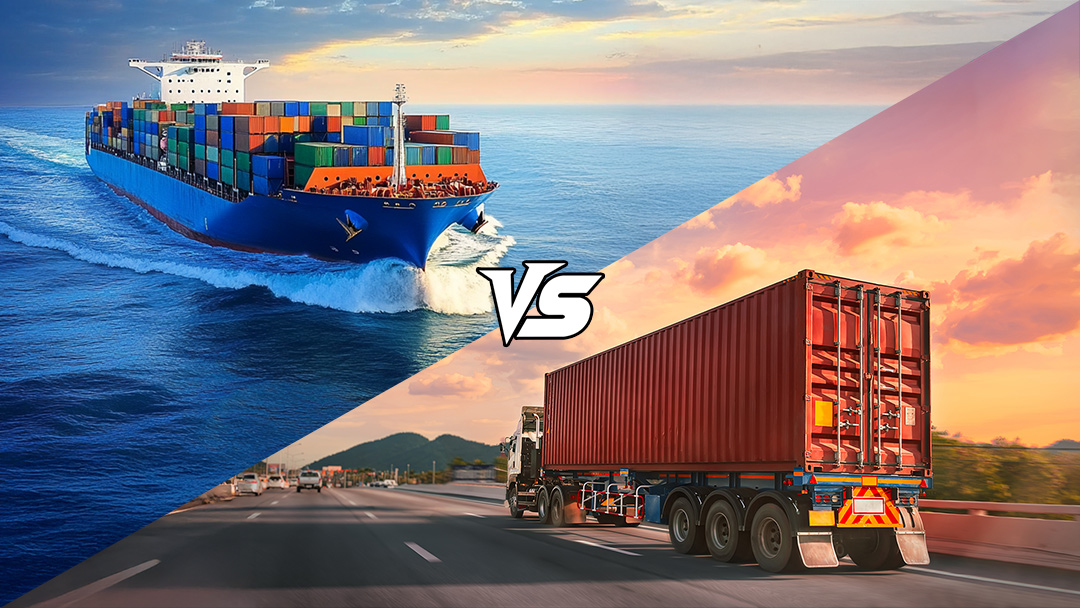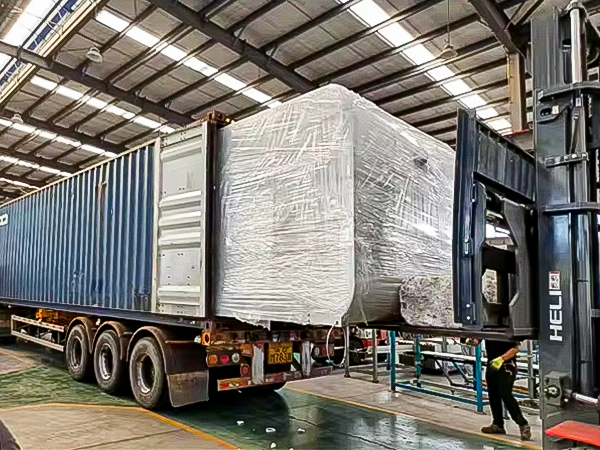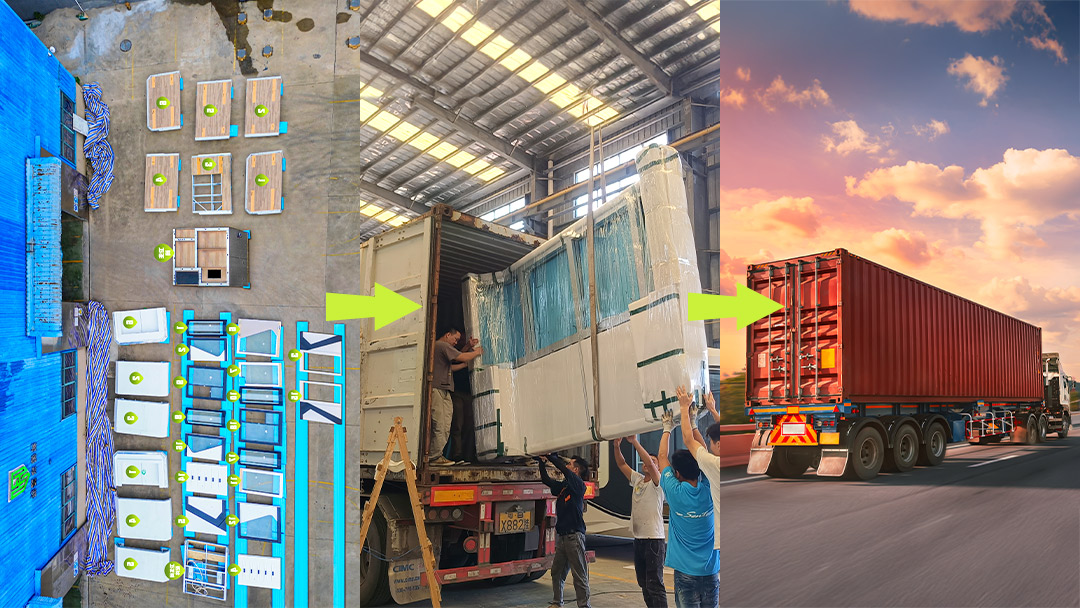You might not realize that capsule houses are becoming a practical solution for housing shortages in urban areas. These compact, pre-fabricated units not only offer innovative designs but also present unique challenges in logistics. When it comes to capsule house delivery, the choice between land and sea transportation can markedly impact delivery times and costs. Understanding these factors can make all the difference in ensuring a smooth changeover from factory to foundation, yet many overlook essential details that could complicate the process. What are those key considerations?

When it comes to delivering capsule houses, you have two primary options: land transportation and sea transportation. Each capsule house delivery method presents unique advantages and considerations that can impact your shipping experience.
Land transportation is ideal for domestic deliveries or cross-border transport to nearby countries. It's typically faster than sea freight and allows point-to-point delivery to your desired location.
However, you might face higher shipping costs, especially for longer distances, and there are size and weight restrictions based on local regulations. This method works best for urgent needs or smaller orders.
On the other hand, sea transportation is the most common choice for international shipping, especially from China to regions like Europe and America. It tends to be more economical, particularly for bulk shipments, since multiple units can fit in one container.
However, expect longer transit times, usually between 25 to 45 days, along with customs clearance requirements and potential delays caused by weather.
Ultimately, the choice between these capsule house shipping methods will depend on your timeline, budget, and specific installation needs. Evaluating these factors will help you make the most informed decision.

Selecting the right shipping method for your capsule house is a crucial step in ensuring a smooth and on-time delivery. For most international projects, sea shipping is highly recommended because of its cost-effectiveness, ability to handle large modular structures, and compatibility with bulk orders.
Here are some best practices and key considerations to keep in mind—the table below summarizes the advantages, drawbacks, and timing of different shipping methods to help you make an informed decision:
| Consideration | Best Practice | Purpose |
|---|---|---|
| Packaging | Use reinforced steel frames and waterproofing | Prevents damage during transport |
| Container Choice | Opt for a 40HQ container | Maximizes space utilization |
| Documentation | Prepare invoices and certifications | Guarantees compliance and smooth customs |
| Insurance | Purchase cargo insurance | Covers potential losses or damages |
| Customs Preparation | Understand local regulations | Prevents delays and unexpected costs |
@ Midjourney AI Image Prompt: /imagine prompt:A minimalist capsule house on a snowy Russian landscape, surrounded by pine trees, with a delivery truck parked nearby. Snowflakes gently fall, highlighting the modern design and shipping logistics of the structure. --v 6 --ar 16:9
Understanding the shipping costs associated with capsule houses is essential for budgeting and planning your purchase. Various factors will influence your total costs, including the container type, the number of units, and the destination port.
However, freight rates can fluctuate based on global demand, fuel prices, and shipping seasons, so it’s wise to research before you choose. You can check real-time freight rates or compare shipping costs across carriers to secure the best option for your project. Platforms like Sofreight and major carriers such as Maersk also provide cost calculators and transit time estimates, helping you plan more accurately.
For instance, when shipping from Guangdong to Russia, you might choose between a 20GP or 40HQ container, with ocean freight typically ranging from $2,000 to $4,000 for a 40HQ.
Don't forget to account for port charges, which can be between $300 and $800, and customs duties, which usually hover around 15-20% of the declared value.
Once your capsule house arrives at Vladivostok, you'll also need to factor in inland railway transport to Moscow, costing between $1,000 and $2,000.
Additionally, guarantee you include cargo insurance and a loss and damage allowance of about 2-5% of your total shipping cost for any minor repairs or handling issues.
After your capsule house is delivered, the installation process is essential for transforming it into a functional living space.
You'll find the setup to be straightforward and efficient, allowing you to take control of your new living environment. Here's what you need to take into account:
The modular design of your capsule house guarantees a fast setup without the need for extensive technical skills.

Plus, if you encounter any challenges, professional support is available, either through online guidance or on-site assistance.
Embracing this quick and easy setup empowers you to enjoy your new space in no time, turning your vision into reality.
Take the reins of your living situation and make the most of your capsule house experience!
When ordering capsule houses, expect delivery times to range from four to eight weeks. Factors like customization, manufacturing schedules, and logistics can influence these timelines, so planning ahead guarantees you stay in control of your timeline.
Yes, you can track your shipment during transit. Most manufacturers provide tracking information, allowing you to monitor progress. Stay in touch with your shipping company to guarantee timely updates and address any concerns promptly.
Did you know that 60-70% of professionals prefer using escrow for secure transactions? For capsule house delivery, you'll need purchase agreements, shipping documents, and permits to guarantee everything's legally compliant and smoothly processed.
Yes, you'll likely face import duties on capsule houses shipped internationally. Rates vary by country and depend on the product's value. Check local regulations to guarantee compliance and avoid unexpected costs during the import process.
If your capsule house gets damaged during shipping, document everything with photos, notify the shipping company immediately, and file a claim. You've got rights, so stay proactive to guarantee a fair resolution.
In the world of capsule house delivery, choosing between land and sea transportation is like selecting the right key to access a door—each method opens unique possibilities. Understanding shipping practices and costs guarantees a smooth journey for your compact home. Once it arrives, the installation process transforms your space into a sanctuary, symbolizing the start of a new chapter. By steering the logistics effectively, you set the stage for a seamless shift into your innovative living solution.
For more details, feel free to contact us for a tailored quote.
